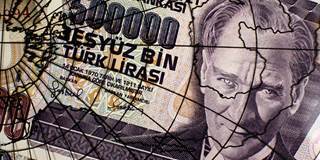When the Republic of Turkey emerged from the wreckage of the Ottoman Empire after World War I, its national ambition was to join Europe as a modern, secular state. But after much progress, Turkish President Recep Tayyip Erdoğan has now all but squandered his country's chance of realizing its founders' vision.
BERLIN – One of the great geopolitical issues in nineteenth-century Europe was the so-called Eastern Question. The Ottoman Empire, then known as the “sick man of Europe,” was rapidly disintegrating, and it remained to be seen which European power would succeed it. When the self-annihilation of World War I finally arrived, it was no coincidence that it emanated from the Balkans, the geopolitical playground for the Ottoman, Austro-Hungarian, and Russian Empires.
All three great empires met their demise after the war. During the Allied partition of the Ottoman Empire, General Mustafa Kemal Atatürk and the defeated Turkish army withdrew to Anatolia, where they successfully repelled a Greek intervention, and then rejected the Treaty of Sèvres. In its place came the Treaty of Lausanne, which paved the way for the establishment of the Republic of Turkey.
Atatürk’s ambition was to turn Turkey into a modern, secular country that would belong to Europe and the West, not to the Middle East. To achieve this goal, he ruled as an authoritarian, and created a hybrid state based on de facto military rule and multiparty democracy. Over the course of the twentieth century, this arrangement produced recurring crises in which Turkish democracy was repeatedly interrupted by temporary military dictatorships.

BERLIN – One of the great geopolitical issues in nineteenth-century Europe was the so-called Eastern Question. The Ottoman Empire, then known as the “sick man of Europe,” was rapidly disintegrating, and it remained to be seen which European power would succeed it. When the self-annihilation of World War I finally arrived, it was no coincidence that it emanated from the Balkans, the geopolitical playground for the Ottoman, Austro-Hungarian, and Russian Empires.
All three great empires met their demise after the war. During the Allied partition of the Ottoman Empire, General Mustafa Kemal Atatürk and the defeated Turkish army withdrew to Anatolia, where they successfully repelled a Greek intervention, and then rejected the Treaty of Sèvres. In its place came the Treaty of Lausanne, which paved the way for the establishment of the Republic of Turkey.
Atatürk’s ambition was to turn Turkey into a modern, secular country that would belong to Europe and the West, not to the Middle East. To achieve this goal, he ruled as an authoritarian, and created a hybrid state based on de facto military rule and multiparty democracy. Over the course of the twentieth century, this arrangement produced recurring crises in which Turkish democracy was repeatedly interrupted by temporary military dictatorships.